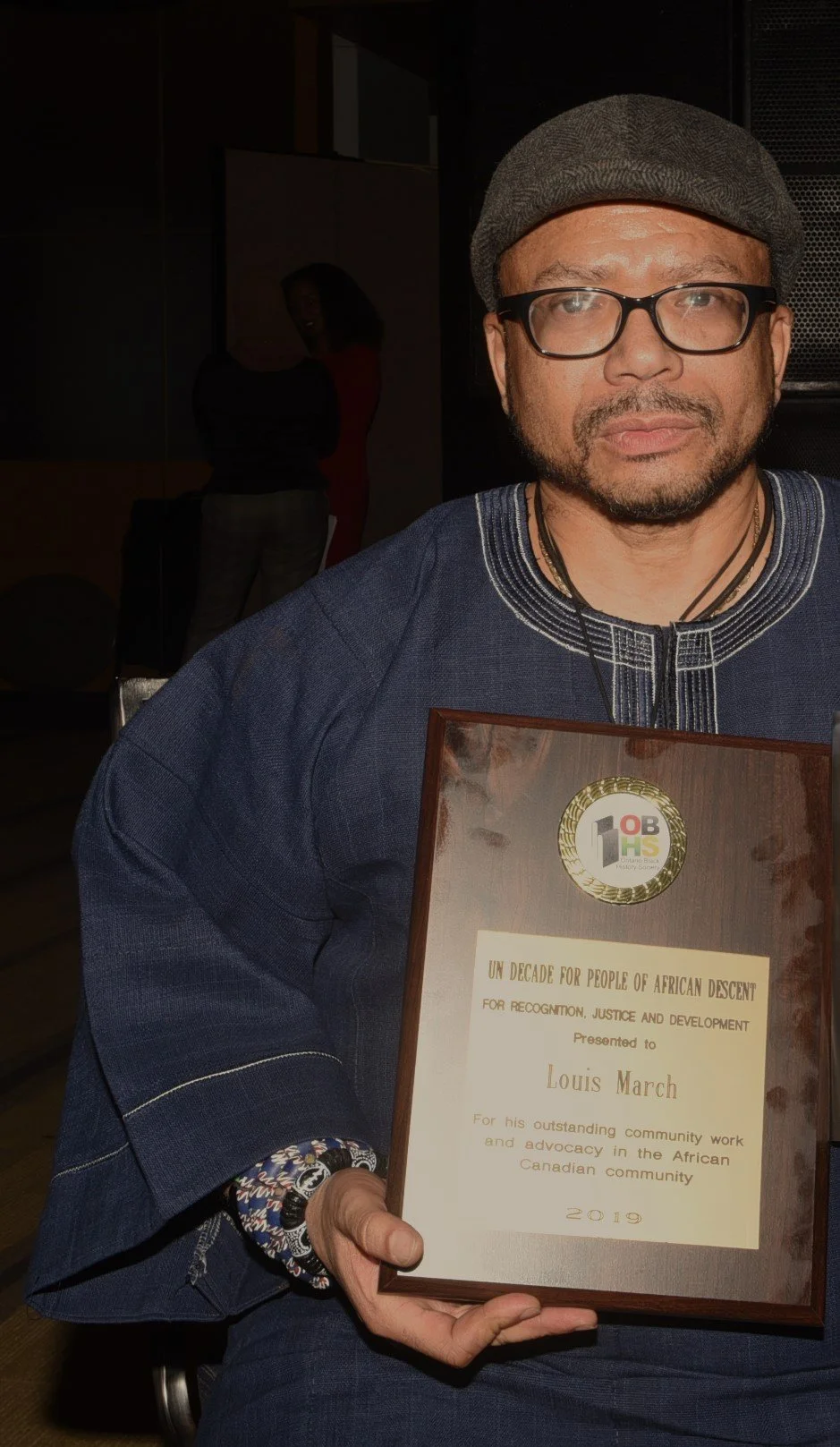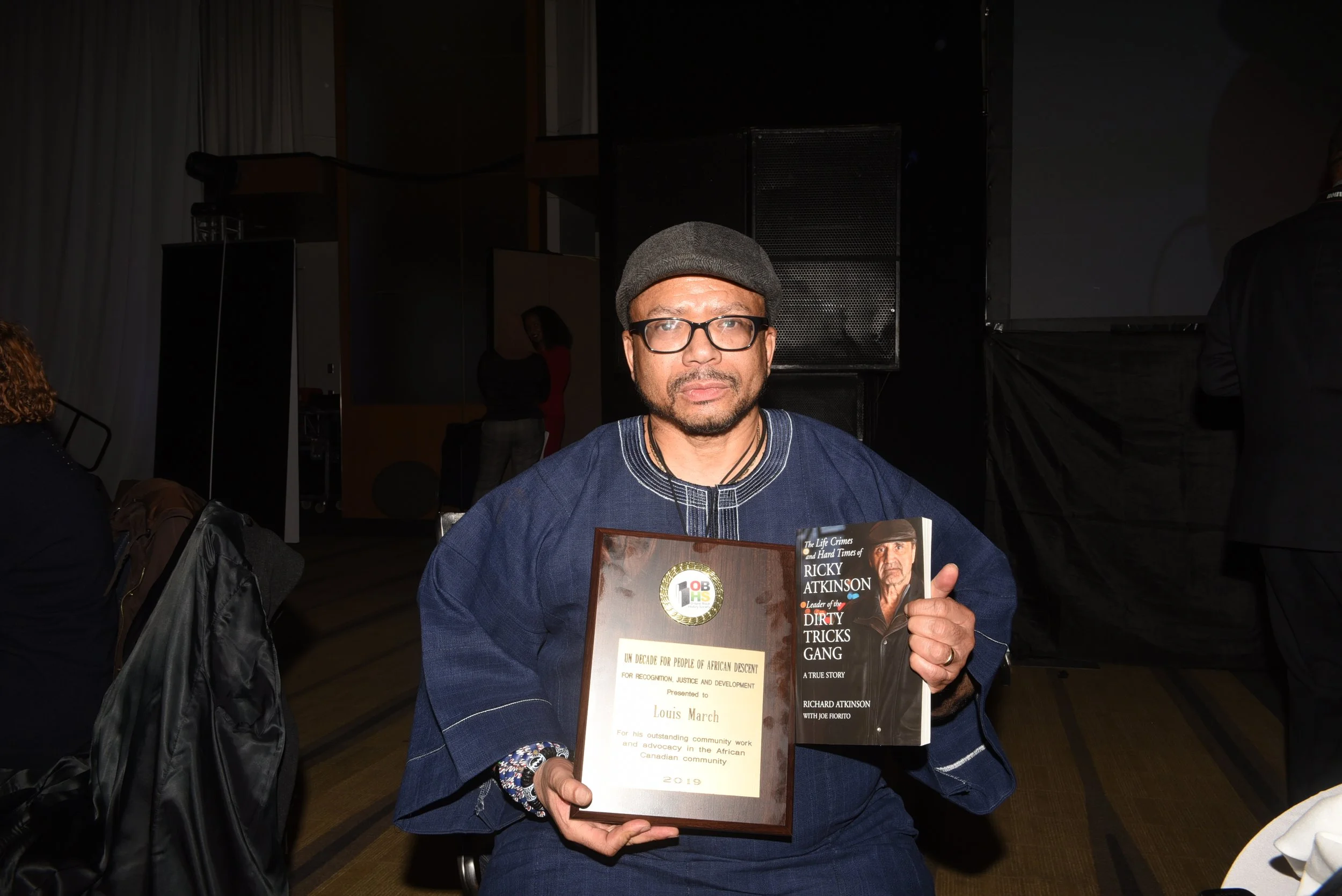Anti-gun violence and community advocate Louis March passes away
July 23, 2024
How can someone who has never lost a close family member to gun violence be so passionate about eradicating this scourge?
Audette Shephard, who co-founded United Mothers Against Gun Violence Everywhere (UMOVE), always asked the question whenever she thought about Louis March or saw him on television speaking out against gun violence.
The Founding Director of the Zero Gun Violence Movement passed away on July 20 after a sudden illness.
He was 68.
Louis March with Donna Harrow at the Zero Gun Violence Movement launch in June 2013 (Photo by Ron Fanfair)
“I have always admired Louis for his passion for young people and the ending of gun violence,” said Shephard whose only child, Justin Sheppard, was murdered in June 2001. “He often told me his wife was mad with him because he quit his full-time job to do this work. The care and commitment he demonstrated for this cause was unbelievable.”
Shortly after her son’s murder 23 years ago, Shephard and other grieving mothers who lost their sons to gun violence started UMOVE.
“We needed something to keep us going in the face of our tragedies,” she said. “Louis did so much outreach to support what we were doing.”
Toronto Police Service Chief Myron Demkiw acknowledged March’s community leadership and anti-gun violence advocacy.
“He helped in the development of our gun and gang strategy framework and helped us focus on a multi-sectoral response with a public health lens in our efforts to eradicate gun violence,” the Chief said. “As a police leader, I deeply valued my relationship with Louis which extended over many years. He was upfront and never hesitated to provide his viewpoint to help our community and guide our work as a police service.”
Peter Sloly crossed paths with March on several occasions during his extensive policing career.
“Louis was an anti-violence activist with a clear and compelling vision that came from a genuine place of compassion and community,” said the former Ottawa Police Chief and Toronto Police Deputy Chief. “His vision is still a work in progress and his passing leaves the rest of us to keep working on solutions to reduce and end gun violence.”
March’s death shocked Liberal Member of Parliament Michael Coteau.
“Over the years, I spent a lot time with Mr. March speaking about how we could reduce gun violence in the city and across the province,” the Don Valley East MP said. “I appreciated his advice and thank him for all the work over the decades.”
Toronto Mayor Olivia Chow said March was a fixture in Toronto neighbourhoods, whether meeting with officials to develop solutions, marching alongside community members to make their voices heard or comforting victims and their families.
“Louis March embodied hope,” she noted. “He often said it was his purpose to support communities through the painful grief and traumatic impact of gun violence and he worked tirelessly at the grassroots level to inspire people to work together and take action. Many communities are mourning and I stand with them in their grief. There will be further recognition of his tireless and enduring legacy to come.”
For City of Toronto Poet Laureate Lillian Allen, March is her hero.
“He touched many lives and saved many lives,” the longtime Ontario College of Art & Design University lecturer pointed out. “His caring and compassionate leadership and his stand for excellence in our community have led and inspired many young people out of societal traps to a brighter and productive future. His legacy is enormous and he will always be in our hearts.”
DeiJaumar Clarke is one of the many young people whose lives were touched by the anti-gun violence advocate.
They met eight years ago at an anti-gun violence meeting in the city.
“I was new to community work and was moved to see how revered and admired this Elder was in our community,” said the social entrepreneur. “He taught me what it truly means to be dedicated to community. He taught me how to be militant, about Dudley Laws and his extensive contributions and the Black Action Defence Committee (BADC). I am so grateful for the love he showed all the mothers whose children were the victims of gun violence and the fact he never sought to profit from Black death. I am also grateful for his Pan-Africanist and Anti-Imperialist political views that have shaped my political views. Every time I asked him how he was doing, he always said ‘The Struggle Continues’.”
The Ontario Black History Society honoured Louis March in 2019 (Photo by Ron Fanfair)
Not one to easily shed tears, sustainable food system developer Anan Loloi admitted he cried after learning of March’s passing.
“My love for the community was ignited when I saw Louis in action in the late 1970s with the Black Youth Community Action Project,” he said. “I always refer to him as Toronto’s original youth leader. He ran a superb race and his journey was one of iconic proportion and inspiration. His name will forever be called in this city.”
When Itah Sadu conceived the idea 11 years ago for the Freedom Train Ride to mark Emancipation Day on August 1 which is March’s birthday, he was the second person she called to float it with.
“When I asked what he thought about the idea and if he would be part of it, he told me to send the flyer and he would circulate it,” she recounted. “He didn’t ask what it was all about, what it was going to cost and how many people would be involved. He saw the vision right away and acted.”
Louis March and Itah Sadu riding the subway (Photo by Amoy Wynter)
March was also a regular fixture at Blackhust Cultural Centre (BCC), a non-profit destination that provides opportunities to experience the culture and history of Canadians of African and Caribbean ancestry.
“He came to every single thing that we did and provided good advice,” added Sadu who is the BCC Managing Director. “When we moved across the street, Louis just came by to keep our company and encourage us. That was huge.”
Migrating from Jamaica with his mother, March completed George Brown’s Business Management program, majoring in Marketing, and worked in the financial service industry before leaving his full-time job to concentrate on community advocacy.
Though busy with community work, he returned to school in 2018 and graduated three years later with a Public Administration & Governance degree from the G. Raymond Chang School of Continuing Education at Toronto Metropolitan University.
In 2020, March received the university’s W. Robert Crampton Award in Criminal Justice & Criminology
“I want to continue my community work addressing the gun violence crisis in Toronto and work with partners to address social justice issues that negatively impact Black people in Canada,” he said when asked what were his plans after graduation.
March’s community engagement went beyond advocating for an end to gun violence.
He was an integral part of the African Canadian Heritage Association.
Originally launched in 1969 as the Black Heritage Association, the organization underwent a name change in 1992 to preserve its unique identity following the establishment of several Black Heritage programs across the city.
“As the Director of Communications, Louis ensured that the community knew what we were all about and the programs we ran,” recalled Veronica Sullivan who became the Children’s Program coordinator in 1981. “He was the one who got us known out there.”
Louis March (l) & Michael Charles were ACHA Presidents (Photo by Ron Fanfair)
March also was a big supporter of Canada’s first Africentric Alternative School launched 15 years ago.
“He was one person who was out there advocating for this school,” Sullivan added. “If we had an issue or were doing something, he got the word out. He was committed and consistent.”
In the late 1970s and early 1980s, March followed the defunct Truths & Rights reggae band.
Founded in 1977 in Regent Park out of Immi-Can, a Black community project, the group comprised Caribbean-born musicians whose socially conscious songs revolved around racism and climate change.
March is survived by his wife Wendie and their son Troy.










